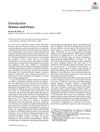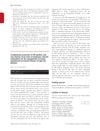17 citations,
October 2017 in “Journal of cosmetic and laser therapy” Laser hair removal is effective and safe for reducing facial hair in women with PCOS and improves their psychological well-being.
16 citations,
April 2020 in “Dermatology practical & conceptual” Laser treatment can effectively reduce unwanted hair growth, particularly for people with fair skin and dark hair.
 October 2024 in “Dermatologic Surgery”
October 2024 in “Dermatologic Surgery” Low-level laser therapy helps increase hair density in androgenetic alopecia.
 October 2023 in “Skin research and technology”
October 2023 in “Skin research and technology” The 675 nm laser effectively improved facial acne scars in dark skin with minimal side effects.

Laser therapy is effective for treating vascular lesions with the right light settings and trained professionals.
 April 2023 in “Journal of Investigative Dermatology”
April 2023 in “Journal of Investigative Dermatology” Combining platelet-rich plasma with laser therapy improves treatment for vitiligo, skin rejuvenation, and acne scars, but more research is needed.
November 2015 in “Springer eBooks” Laser hair removal can be effective for people with darker skin tones.

Low-level laser therapy is a safe, painless method that effectively treats acne and improves skin without post-treatment care.
 2 citations,
January 2018 in “Recent clinical techniques, results, and research in wounds”
2 citations,
January 2018 in “Recent clinical techniques, results, and research in wounds” Low-Level Laser Therapy helps heal wounds and regenerate tissue when used correctly.
294 citations,
August 1999 in “Journal of the American Academy of Dermatology” Laser hair removal is safe with the right settings, but side effects like pain and skin changes are more common in darker or tanned skin.
68 citations,
January 2012 in “Lasers in surgery and medicine” Microdermabrasion combined with Q-switched Nd:YAG laser is a safe and effective way to treat stubborn melasma.
 December 2018 in “Lasers in Surgery and Medicine”
December 2018 in “Lasers in Surgery and Medicine” Science improves peace by advancing medical treatments, like laser therapies and non-invasive imaging.
April 2023 in “Journal of Investigative Dermatology” In-person laser treatments help hair growth in androgenetic alopecia.
 May 2023 in “Elsevier eBooks”
May 2023 in “Elsevier eBooks” Low-level laser/light therapy is effective and safe for mild to moderate hair loss in men and women when combined with other treatments.
 7 citations,
March 2017 in “Actas Dermo-Sifiliográficas”
7 citations,
March 2017 in “Actas Dermo-Sifiliográficas” Several new treatments for different types of hair loss show promise in improving patient quality of life.
 September 2024 in “Journal of the American Academy of Dermatology”
September 2024 in “Journal of the American Academy of Dermatology” Fractional and excimer lasers effectively treat various types of alopecia and promote hair growth.

Tailored nonsurgical cosmetic procedures are crucial for safely treating diverse skin types, especially skin of color.
 April 2024 in “Lasers in medical science”
April 2024 in “Lasers in medical science” Lasers and light therapies are effective in promoting hair regrowth for different types of hair loss.
Laser hair removal works well for light skin with dark hair but needs caution for darker skin.
19 citations,
January 1999 in “Journal of cutaneous laser therapy” Laser hair removal is a promising method for long-term or permanent hair removal.
 November 2000 in “Current problems in dermatology”
November 2000 in “Current problems in dermatology” New treatments for hair loss and excessive hair growth show promise with few side effects and advancements in laser technology.
 1 citations,
June 2012 in “Actas Dermo-Sifiliográficas”
1 citations,
June 2012 in “Actas Dermo-Sifiliográficas” Early and aggressive treatment of scarring alopecia is important to prevent further hair follicle damage.
15 citations,
January 2019 in “Lasers in surgery and medicine” Home-use light devices can significantly reduce hair but are less effective on very dark skin and slower than professional devices.
 3 citations,
September 2016 in “British Journal of Dermatology”
3 citations,
September 2016 in “British Journal of Dermatology” Warts in HIV-positive men can have serious abnormal cell growth, needing careful analysis and treatment to prevent cancer.
1 citations,
August 2024 in “Cosmetics” Melasma treatment is difficult, but combination therapies and personalized plans show promise.
 September 2022 in “Polish Hyperbaric Research”
September 2022 in “Polish Hyperbaric Research” Some treatments for hair loss, like finasteride, biotin, and minoxidil, can be effective, but their success varies by individual case.
 April 2016 in “Medical Acupuncture”
April 2016 in “Medical Acupuncture” The document concludes that hair loss in women is treated with medications, therapies, and surgery in Western medicine, and with acupuncture and herbs in Chinese medicine, but hereditary hair loss is hard to reverse.
 February 2025 in “Expert Opinion on Drug Metabolism & Toxicology”
February 2025 in “Expert Opinion on Drug Metabolism & Toxicology” Future alopecia treatments will improve with targeted therapies and personalized approaches.
 70 citations,
February 2015 in “Expert Opinion on Drug Discovery”
70 citations,
February 2015 in “Expert Opinion on Drug Discovery” Topical drugs and near-infrared light therapy show potential for treating alopecia.
 114 citations,
April 2004 in “International Journal of Dermatology”
114 citations,
April 2004 in “International Journal of Dermatology” Postinflammatory hyperpigmentation causes dark skin patches and needs personalized treatment.



















